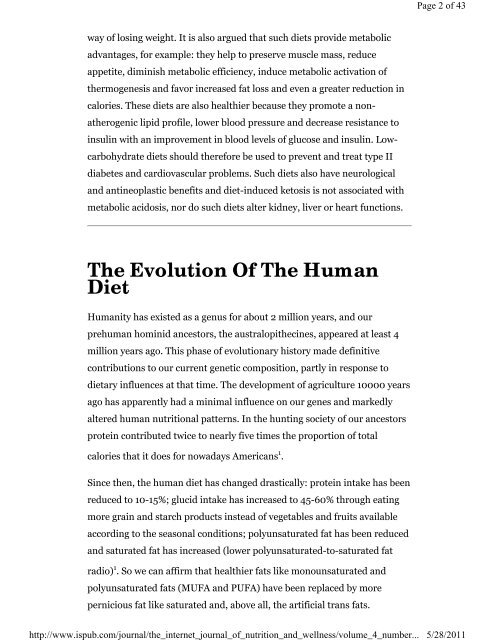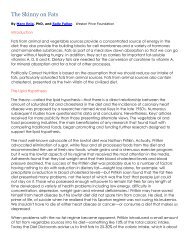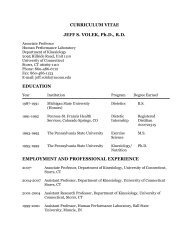Arguments in favor of ketogenic diets - Nutrition and Metabolism ...
Arguments in favor of ketogenic diets - Nutrition and Metabolism ...
Arguments in favor of ketogenic diets - Nutrition and Metabolism ...
Create successful ePaper yourself
Turn your PDF publications into a flip-book with our unique Google optimized e-Paper software.
http://www.ispub.com/journal/the_<strong>in</strong>ternet_journal_<strong>of</strong>_nutrition_<strong>and</strong>_wellness/volume_4_number...Page 2 <strong>of</strong> 435/28/2011way <strong>of</strong> los<strong>in</strong>g weight. It is also argued that such <strong>diets</strong> provide metabolicadvantages, for example: they help to preserve muscle mass, reduceappetite, dim<strong>in</strong>ish metabolic efficiency, <strong>in</strong>duce metabolic activation <strong>of</strong>thermogenesis <strong>and</strong> <strong>favor</strong> <strong>in</strong>creased fat loss <strong>and</strong> even a greater reduction <strong>in</strong>calories. These <strong>diets</strong> are also healthier because they promote a nonatherogeniclipid pr<strong>of</strong>ile, lower blood pressure <strong>and</strong> decrease resistance to<strong>in</strong>sul<strong>in</strong> with an improvement <strong>in</strong> blood levels <strong>of</strong> glucose <strong>and</strong> <strong>in</strong>sul<strong>in</strong>. Lowcarbohydrate<strong>diets</strong> should therefore be used to prevent <strong>and</strong> treat type IIdiabetes <strong>and</strong> cardiovascular problems. Such <strong>diets</strong> also have neurological<strong>and</strong> ant<strong>in</strong>eoplastic benefits <strong>and</strong> diet-<strong>in</strong>duced ketosis is not associated withmetabolic acidosis, nor do such <strong>diets</strong> alter kidney, liver or heart functions.The Evolution Of The HumanDietHumanity has existed as a genus for about 2 million years, <strong>and</strong> ourprehuman hom<strong>in</strong>id ancestors, the australopithec<strong>in</strong>es, appeared at least 4million years ago. This phase <strong>of</strong> evolutionary history made def<strong>in</strong>itivecontributions to our current genetic composition, partly <strong>in</strong> response todietary <strong>in</strong>fluences at that time. The development <strong>of</strong> agriculture 10000 yearsago has apparently had a m<strong>in</strong>imal <strong>in</strong>fluence on our genes <strong>and</strong> markedlyaltered human nutritional patterns. In the hunt<strong>in</strong>g society <strong>of</strong> our ancestorsprote<strong>in</strong> contributed twice to nearly five times the proportion <strong>of</strong> totalcalories that it does for nowadays Americans 1 .S<strong>in</strong>ce then, the human diet has changed drastically: prote<strong>in</strong> <strong>in</strong>take has beenreduced to 10-15%; glucid <strong>in</strong>take has <strong>in</strong>creased to 45-60% through eat<strong>in</strong>gmore gra<strong>in</strong> <strong>and</strong> starch products <strong>in</strong>stead <strong>of</strong> vegetables <strong>and</strong> fruits availableaccord<strong>in</strong>g to the seasonal conditions; polyunsaturated fat has been reduced<strong>and</strong> saturated fat has <strong>in</strong>creased (lower polyunsaturated-to-saturated fatradio) 1 . So we can affirm that healthier fats like monounsaturated <strong>and</strong>polyunsaturated fats (MUFA <strong>and</strong> PUFA) have been replaced by morepernicious fat like saturated <strong>and</strong>, above all, the artificial trans fats.






